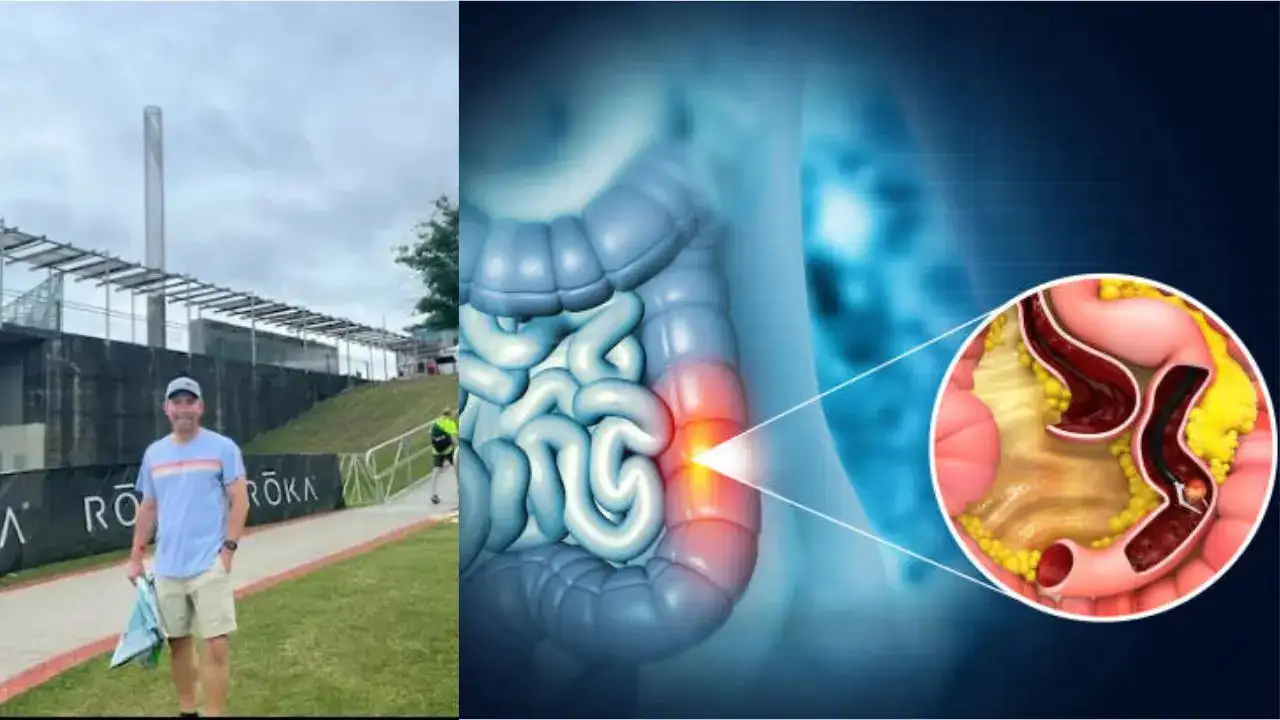Ashima Sharda Mahindra • 26 Apr 2025
A Fit and Healthy Ironman Participant Got Rectal Cancer at 45; Here's The One Symptom He Missed

Marcus, a father of three, who owns a small manufacturing company, was startled to see blood in his stool, the first sign he missed
Forty-five-year-old Marcus Wendling toughed out a half Ironman—a gruelling triathlon consisting of a 1.2-mile swim, a 56-mile bike ride, and a 13.1-mile run — in just under six hours. But despite achieving the peak of his fitness, he fell to the worst of his health markers. Marcus was diagnosed with stage 3 rectal cancer just a few months later. “I eat a healthy diet. I exercise six days a week. I always have been on top of my health,” Wendling, who lives in Dayton, Ohio, told The New York Post. “So up until that time, you feel like you have this sense of invincibility.”
According to experts, rectal cancer - a type of cancer that develops in the rectum, the last part of the large intestine, which is often part of the broader category of colorectal cancer—is common among those who are under 50 years of age. While doctors do not exactly know why, they urge people to notice early signs and symptoms, which are crucial in providing timely treatment to beat the cancer.
How did Marcus miss the early signs of rectal cancer?
Marcus, a father of three who owns a small manufacturing company, was startled to see blood in his stool. Apart from that, he says he had no other symptoms. “I’ve never had a medical issue or a diagnosis,” he said. “I went for a full physical, and everything — all the blood work and numbers — turned out great,” he added, “but I told that doctor in Dayton, I said, ‘Hey, I need to get a colonoscopy. I’m seeing blood at times in my stool,’ and that’s what led to the colonoscopy,” Marcus added.
That was Marcus’ first colonoscopy. He does not have a family history of any kind of cancer and wasn’t experiencing symptoms, so he saw no reason to have one at the time.
Later, a biopsy revealed a benign polyp in his colon, and doctors had to remove a large polyp from his lower rectum, which tested positive for cancer. “Over the next three months, I went through various tests,” he recalled. “There was an attempt to remove the remaining tissue through a minimally invasive procedure, and that was unsuccessful.” Due to the location of the tumour, Marcus needed a lower anterior resection. In the endlessly long surgery, which went on for more than five years, doctors removed part of the rectum and reattached the remaining healthy part to the colon. Three of the 12 lymph nodes were also removed during surgery as they had tested positive or stage 3 rectal cancer.
Thereafter, Marcus underwent 12 weeks of chemotherapy with minimal side effects and got used to life with an ileostomy bag, a pouch that collects waste. “I was exercising with it, running with it,” Wendling said. Later, he got rid of the bag and started living a normal life.
Marcus has to have quarterly scans of his chest and abdominal area and yearly colonoscopies for now.
What is rectal cancer?
Rectal cancer typically is a slow-growing cancer that forms on the inner lining of your rectum - the last several inches of your large intestine. Doctors say even though most rectal cancers start as clumps of abnormal polyps known as adenomas, they need to be identified early for proper treatment.
Cancer screening, like colonoscopies, often detects polyps that can cause cancer. Regular screenings to detect and remove polyps reduce your risk of developing rectal cancer. If you have rectal cancer, surgery to remove small cancerous tumours may cure the condition.
Rectal cancer is the third most common cancer in your digestive system, behind colon and pancreatic cancers.
Signs and symptoms of rectal cancer
You can have rectal cancer for years without noticing changes in your body. In many cases, rectal cancers do not show any symptoms at all. However, some people may notice certain warning signs, a few of which include:
- Rectal bleeding
- Bloody diarrhoea
- Constipation
- A sudden change in your bowel movements
- Poop that looks stringy
- Tiredness and weakness
- Pain in abdomen
- Unexplained weight loss
Get Latest News Live on Times Now along with Breaking News and Top Headlines from Health and around the world.